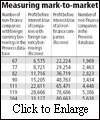The Confederation of Indian Industry (CII) has proposed that the losses (or gains) arising from changes in the value of foreign currency assets and liabilities because of exchange rate fluctuations not be charged to the profit and loss account of the period of this change. The fear is that because the rupee has depreciated substantially in recent months, companies may be forced to report large losses in the coming quarter ended March 2009, and also in the annual financial statements that end in March 2009. In all fairness, CII is not asking for a removal of the mark-to-market concept entirely. It states that the losses or gains arising from this should not be charged only to the accounting period such as a quarter but be spread over the remaining tenor of the assets / liabilities. It is obvious that the CII is not merely engaging in a discussion of the appropriateness of the existing accounting policies. It is trying to reduce the damage that the coming results of March 2009 would portray.
How much is at stake? Nobody knows. Because, companies are not required to disclose their balance sheets on a quarterly basis. Thus, the latest data available is only as of March 2008. But, let us work with the data available in the annual accounts of companies till March 2008 with some assumptions to guess what is the scale of the expected damage.





According to CMIE?s Prowess database, as of March 2008, the foreign currency borrowing of non financial services companies was of the order of Rs 1.9 lakh crore. 849 companies reported foreign currency borrowings in their audited annual accounts that ended in any month of 2007-08. We assume a 10 per cent increase in this by March 2009. That implies that the outstanding foreign borrowings could be of the order of Rs 2.1 lakh crore if we assume the same exchange rate as it prevailed in March 2008.
However, the problem is that the rupee has depreciated by about 21 per cent over the past one year. As a result, the borrowing is higher by nearly Rs 45,000 crore. It is not Rs 2.1 lakh crore but Rs 2.54 lakh crore.
The aggregate profits of these 849 companies in 2007-08 was Rs 2.4 lakh crore. This is estimated to have fallen to Rs 2.2 lakh crore by 2008-09. Profits growth has been sluggish and we assume would remain sluggish in the March 2009 quarter. Thus, the Rs 45,000 crore hit would eat away about 20 per cent of the profits before tax of these companies. On an aggregate basis, that is not much. Profits do vary substantially year-on-year.
But, there are two caveats. First, the estimate made above could be slightly lower than the actual borrowings of companies because all companies do not disclose their foreign currency borrowings separately. According to the Ministry of Finance?s ?India?s External Debt? publication of December 2008, the external commercial borrowing was Rs 2,50,033 crore. But, this includes the commercial bank loans. Secondly, some individual companies, possibly some very large companies, could be hit significantly more severely than the average 20 per cent estimated above.
At a policy level, should the interest of just about a thousand companies be allowed to adversely impact perceptions regarding the quality of financial statements of the rest of the companies? If laws are changed to suit these thousand-odd companies shouldn?t the rest object? Whose interests are we talking about ? the entire industry or just about ten per cent of the industry? While these quarters will pass, the perception that India is willing to change the laws to suit a section of the industry will linger. We are possibly paying a large price for a small gain by changing the laws.
On a separate note, it is unfair that while companies took the benefit of an appreciating rupee in the recent past, they are not willing to take the hit of a depreciating rupee. See the sharp increase in these gains in the table presented alongside. The role of accounting is to correctly report the volatility in earnings and not hide it.
Newspaper reports suggest that the National Advisory Committee on Accounting Standards has favoured suspending the mark-to-market rule for exchange rate changes for two years If this holds companies should be at least required to disclose the mark-to-market losses in its notes to accounts. Companies do not specifically disclose the mark-to-market losses in the Annual Reports. However, they do disclose gains or losses because of exchange rate fluctuations. It would be useful if the Annual Reports specifically disclose, in the notes, the losses or gains because of exchange rate fluctuations.
Regulators should enhance the amount of public disclosures companies are required to make mandatorily. Companies should enhance the amount of public disclosures they make voluntarily. Investors need not be classified as unintelligent who cannot understand the conditions under which the profits have taken a hit this year. . Retail investors account for less than ten per cent of the total investments into the equity of listed companies. Institutional investors account for a much greater 23 per cent. It is analysts among the institutional investors who analyse the financial statements threadbare. They understand that in the March 2009 quarter, the losses of the manufacturing companies that have borrowed overseas would be exaggerated and that the profits of the banks would overstated. And, that variations caused by marking the assets and liabilities to market value could overshadow the profits or losses caused by normal operations.
It is amongst institutional investors that confidence building is needed the most. And, it is here that greater disclosures and greater transparency would do the job better than changing the rules of the game midway.
The author heads the Centre for Monitoring Indian Economy















